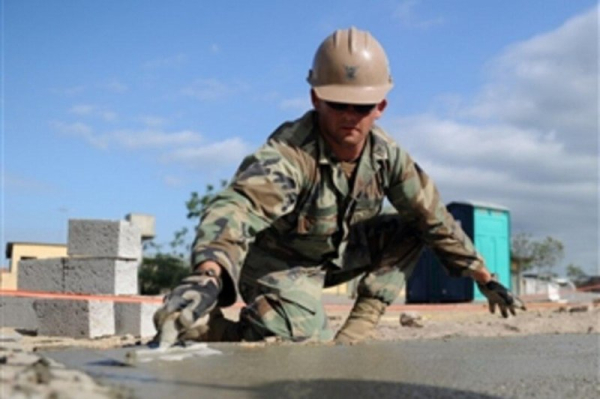

U.S. Navy Petty Officer 2nd Class Andras Toth, assigned to Naval Mobile Construction Battalion 28, trowels the foundation of a new classroom being built at the Jacobo Vera school in Manta, Ecuador, in 2011. Department of Defense photo
Ecuadorian President Daniel Noboa said a national referendum will be held by the end of 2025 to decide whether to allow the return of a U.S. military base in the coastal city of Manta.
“The installation of foreign military bases is one of my government’s priorities to strengthen international cooperation on security,” Noboa told the Corriere della Sera newspaper during a recent tour of Europe.
He added that support could also come from European nations to help Ecuador combat transnational organized crime.
Ecuador’s National Assembly approved on June 3 a partial constitutional amendment to lift the country’s long-standing ban on foreign military bases. The current constitution declares Ecuador a “territory of peace” and prohibits such installations.
The amendment still requires approval from the Constitutional Court and a national referendum before it can take effect.
The U.S. military operated a base in Manta until 2009, when a new constitution adopted under President Rafael Correa banned foreign military installations, citing a violation of national sovereignty.
Defending his proposal, Noboa said drug trafficking cannot be fought in isolation.
“Forty percent of Ecuador’s drug exports go to the United States and another 40% to the European Union,” he said.
He warned that Ecuador is under attack from “more than 50,000 armed men and women who spread terror, attack society, neighborhoods and prisons. They aim to impose a parallel power to the state. That fits the definition of terrorists.”
Official and independent reports show that during the U.S. military’s operation in Manta from 1999 to 2009, annual cocaine seizures averaged 24,421 kilograms — an increase of almost 500% compared to earlier years.
The peak came in 2009, when authorities seized 66,181 kg. of cocaine, according to United Nations data.
Mario Pazmiño, former chief of military intelligence in Ecuador, said construction is already underway in Manta, but the nature of the planned facility remains unclear. He added that, given the close ties between Noboa and U.S. President Donald Trump, it is likely the reopening has already been agreed to — “which doesn’t necessarily mean it will be a U.S. installation on Ecuadorian soil.”
“The return of the United States to Manta and other locations is a positive step for our cooperation against drug trafficking in the Pacific,” said Evan Ellis, a professor at the U.S. Army War College. He said the move has led to “misunderstandings in the press and has been distorted by the left.”
Ana María Cordero, former anti-corruption minister under President Guillermo Lasso, said the United States would likely aim to install a radar platform at the Manta base to track drug trafficking.
Opposition lawmakers in Ecuador — particularly from the Citizen Revolution movement founded by former President Rafael Correa — have opposed reopening the base, arguing it would represent a major loss of national control and a setback to Ecuador’s status as a “territory of peace.”
They argue that security cooperation should not require foreign military bases on Ecuadorian soil, but should instead rely on specific agreements for technical or intelligence support.
The port of Manta sits 25 nautical miles from an international trafficking route and about 24 hours by sea from the Panama Canal — a strategic point along drug smuggling routes to Central and North America.